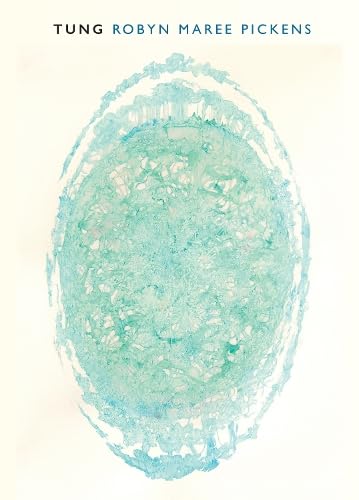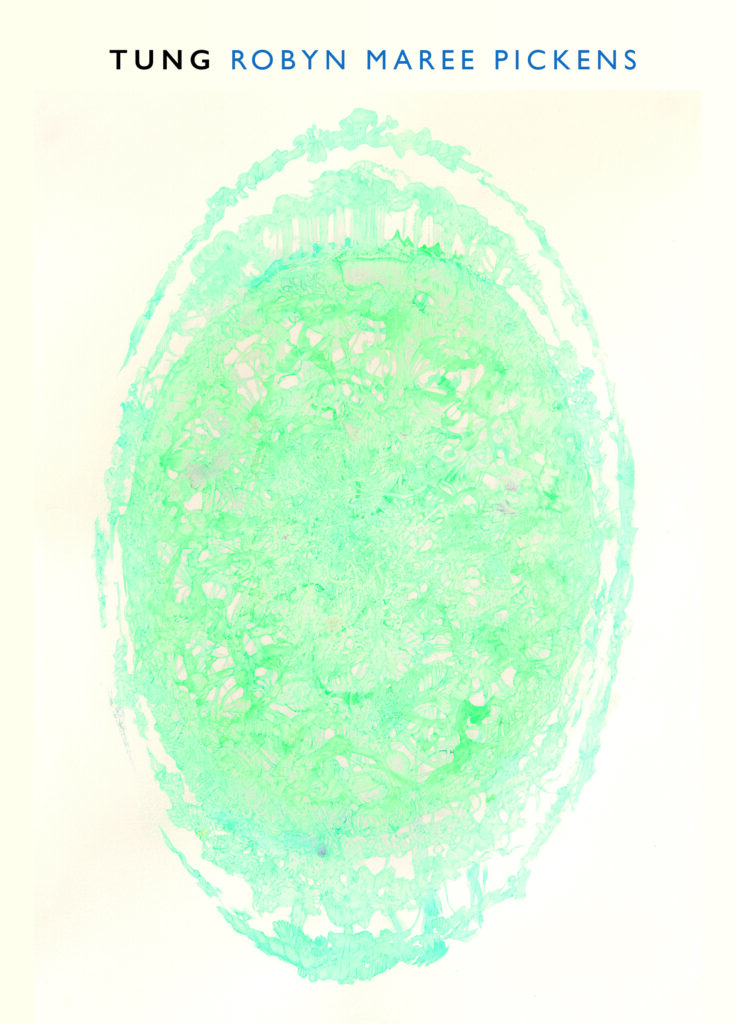Tung

Tung by Robyn Maree Pickens. OUP (2023). RRP: $25.00. PB, 87pp. ISBN: 9781990048609. Reviewed by Michelle Elvy.

Robyn Maree Pickens is an art writer, poet, curator, and text-based practitioner, all of which is evident in her debut poetry collection. Tung opens with an invitation, a weaving of words and wonder on the page:
Brush the bats from your tongue
A skylight is installed
Take care with their furry wing membranes wrists thumbs
They have the eyes of seeds
Taste is distributed for oh that hunger leak of honey (‘Keen sight’, p.9)
In this poem we sense a warning, an admonishment, and also a possibility for hope, a sweetness. It is both sensual and demanding. Turn the page and find a hum that harangues but also suggests something more, beyond beleaguered: ‘Some months the heaviness reaches my irises. Things that are higher than me like honeybees, skyscrapers, flowing magnolia trees, and jet planes are filled with light and lightness’ (‘Include the humming text’, p.10). There is a sense of immediate awareness, of tender care, despite the heaviness.
The opening pages take the reader through the moods of the world: from flowers and bees to shifting sands and sounds of breathing; we sense the known and unknown; we move from the specific (‘salted and unsalted’, p.11) terrain of South Dunedin to the vastness of emotional landscape:
Sometimes I just want to write ‘it is vast’; without having to think about all the things that are vast, like loneliness or desire, which in turn could be written about differently: the gap in a forked tree instead of loneliness, or a scene involving a wolf for desire perhaps. (‘Lover, I should’ve hailed you…’, p.12)
That sense of the vast holds this book together: a vastness of language, of history, of breath, of nature, of ruin. The poems require re-reading, and it helps that Pickens includes a few small notes at the back, enough to assist navigating some of the coded language. There are lists and statistics: decline in butterfly population, the threat to fish and more. They require study; there is linguistic, imagistic and spatial sequencing in this poetry, and it prompts multiple readings. There is also joy at the pop and fizz of philological possibility. And sometimes there is tenderness in the space between words.
In all this, there is a wonder at sounds on the tongue, letters between teeth – at how they matter. These poems challenge and engage the reader with linguistic and sensory input, with conceptual work as well as the nitty-gritty world of sound as the poet moves in English and Spanish, Finnish and Japanese. She plays with meaning and sound: the repeated fff’s and ooo’s mid-collection; the notion of space and what it might tell us about sound or absence of it; the shape of words both whole and fragmented. Here, a small poem:
inter~breathing
[fi]rst
re[fi]nery
[fi]shermen
[fi]lm’s
[fi]sh
[Th]e
[fi]shermen
[fi]shing
[Th]is
over[fi]shing (‘inter~breathing’, p.45)
By the time we reach this poem, we understand this collection offers an interconnectedness of life and language and loss; these pages hold that lament. We are told early on: ‘Lover, cry comes from the Greek word krios meaning cold’ – which the poet links to climate urgency and loss and the need for safety. (‘Lover, I should’ve hailed you…’, p.12)
While Pickens is in dialogue with the natural world and etymology, she also engages people. Her poems refer to other poets and scientists, researchers and visual artists. In her lines we encounter Cecilia Vicuña, Joanna Margaret Paul and others. The two-page spread ‘ki ki’ (pp.60-61) is a nod to Robin Wall Kimmerer’s suggestion that non-human beings should be referred to as ‘ki’ (singular) and ‘kin’ (plural) rather than ‘it’. That idea occupies a space in the middle of the collection, reflected in large symbols across two pages. It holds your attention and asks you to think. I listened to an interview with Cecilia Vicuña recently, and I was struck by her ideas of visual prompt and sound and knowing – how we can know something after seeing it, after sensing its reality, its repetition. There is order in repetition; there is meaning, too. This made Pickens’ poetry come alive even more for me.
Bold rhythms and complex repetitions – that we see and hear and then further imagine – draw the reader forward. In ‘offering’ (p.56), we come to a poem that methodically and melodically persists, beginning:
oh
oh see
oh spring
ocean
oh
our oh
our thirst
our this
this
this fluid
this our thee
this tide our
this tide
this body
But it’s not all wordplay. The tone of this collection, while demanding, is also gentle. There is a narrative arc, and the collection as a whole offers a story of our world. ‘Falling into water’ (p.47) stands out for its eight parts and its evocative leaps across space and time, its unusual pairings of ideas, down to the last line about kelp and wild radish. And often, nestled between the lines of language and sound, there is a softness, a sensuality that is arresting and embracing. The poem ‘opening like eyes’ (p.36) is intimate, memorable. It begins:
last night you texted my name with two y’s
this is a new spelling
i was listening to sawako nakayasu
you liked the red mouth of the cover
i want to make everything sensual
like the red mouth open
i am endo
the in one (t you)
not exo
the out one
i could not concentrate on sawako
because I am so endo right now
i can only think endo like eyelashes (‘opening like eyes’, p.36)
This is an urgent and poignant collection from a poet who has been called an ‘eco-pioneer of words’ (1). And while the collection is a song for our planet in peril, the title Tung indicates the world of sound and possibility that Pickens offers in these pages. The word ‘Tung’, phonetically like ‘tongue’ and suggesting the sensuality within, also refers to a flowering tree – the first seeds of renewal, of life.
- OUP, 2023. https://www.otago.ac.nz/press/books/tung.
Michelle Elvy is an editor, manuscript assessor, writer and creative writing teacher. Her books include the everrumble and the other side of better, and her anthology work includes, most recently, A Kind of Shelter: Whakaruru-taha (MUP 2023). She edits at Flash Frontier and AT THE BAY | I TE KOKORU.